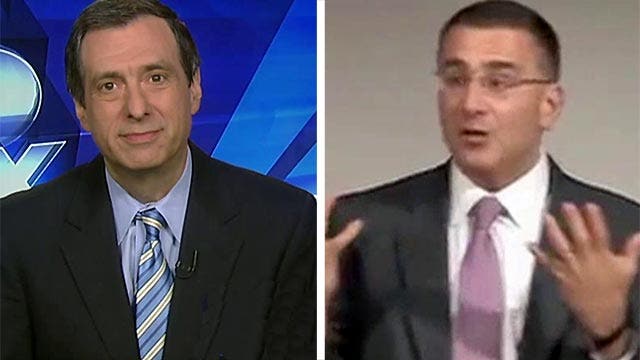Kurtz talks to man who found ObamaCare architect's comments
Citizen-journalist Rich Weinstein had personal reason for scouring online video of MIT's Jonathan Gruber
The man who changed the ObamaCare debate was at a gas station when I reached him, and he wasn’t dying to talk.
“I really want to stay out of the limelight,” said Rich Weinstein, a Philadelphia investment adviser. “This is not about me.”
But it is about him in the sense that if not for one slightly obsessed citizen, we wouldn’t have the videos of Jonathan Gruber saying the health care law was deceptively designed and its passage depended on the stupidity of the American public. And it is about his frustrating struggle to get that information out to the media.
Still, Weinstein would not be coaxed into an on-camera interview, or even provide a photograph. He doesn’t want his 15 minutes.
“I think people are going to look for a target. I don’t want to be Rich the Plumber,” he told me.
Weinstein is up front about the fact that his motives were personal. His insurance policy was canceled, he says, because of the Affordable Care Act, and his premiums wound up doubling.
He started out searching for another administration adviser and then switched to Gruber. He sat through hour after tedious hour of video taken at academic conferences and in other settings.
This helps explain why a self-described regular guy was able to unearth what the media could not. Few news organizations could afford to have a reporter spend a long period searching for a needle in an online haystack, especially without a tip that the needle existed at all. Maybe everything that Gruber had to say about the law he helped devise was boring. But Weinstein kept at it, although he did give up the search for awhile during his kids’ lacrosse season.
Last December, Weinstein found one video in which Gruber, an MIT professor, said that ObamaCare subscribers wouldn’t get tax benefits if their states didn’t set up health care exchanges, meaning they would be losing out to those in states that did create the websites.
That’s when Weinstein used every means he could think of, from Facebook to phone calls, to get the attention of journalists. He says he tried getting messages to Fox News, Forbes, National Review, Glenn Beck and a network affiliate in Philadelphia where a friend worked. Nobody bit. Nobody called back.
“It was so frustrating,” Weinstein said. “I tried really hard to give this to the media. I had this and couldn’t get it to anybody that knows what to do with it.” All he wanted, Weinstein says, was a train ride to D.C. for him and his lawyer, and “I was going to give them everything for nothing, no money, all I wanted was autographed pictures of the people I was working with to hang on my office wall.”
Crickets.
He finally posted a comment on the web page of the Volokh Conspiracy, a group of conservative lawyers whose blog is hosted by the Washington Post. A conservative activist picked it up, and Forbes wound up carrying a piece by contributor Michael Cannon, dubbed by the New Republic “Obamacare’s Single Most Relentless Antagonist.”
It wasn’t until shortly before the midterms that Weinstein found what came to be known as Gruber’s “stupidity” video. He plastered it on his Twitter feed days later, sometimes inserting the names of journalists to try to grab their attention. This time, the news was quickly picked up by Fox, the Daily Caller and other media outlets (but not the broadcast networks or major newspapers).
But even then, Weinstein was sounding cautionary notes on Twitter.
“Did first 2 interviews ever- both with orgs on the left. Hope I'm not turned into a crazy or sound ‘stupid.’ Videos speak-o for themselves”
And: “Just to be clear, I don't actually live in my mom's basement wearing a tin foil that!”
I can attest that he is actually quite lucid, and sounds nothing at all like a conspiracy theorist. Just a ticked-off guy who lost his insurance.
I pressed again on why he wouldn’t appear on camera or provide a photo. Weinstein said he didn’t want to be a political target, and recalled watching some pundits joke about whether Mitt Romney colored his hair.
“I thought, ‘Holy cow, if they’re gonna do that, what are they gonna do to me? I just want out.”
But he had a parting thought about the press and citizen journalists. There must be more Weinsteins out there, maybe one in each state, and they need a forum. The media have “got to open up a gateway,” he said, to receive such information.













































